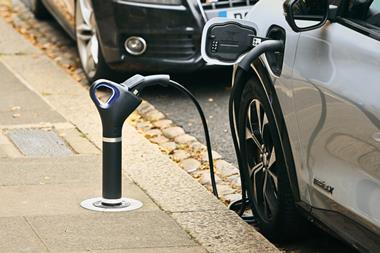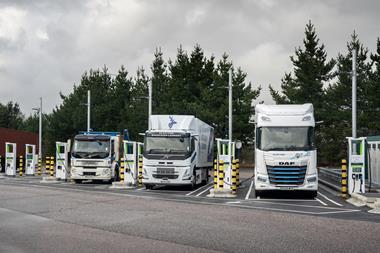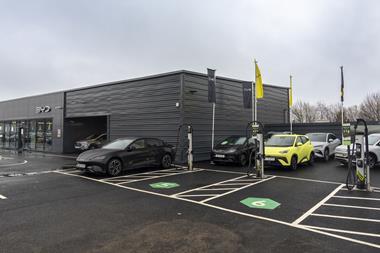SMMT calls for installation of 2.3m charging points by 2030 and review of fuel duty as part of 12-point plan to secure the UK car industry

The shift to electrified vehicles is the biggest challenge facing the automotive sector, according to a new report by the Society of Motor Manufacturers and Traders (SMMT), which has launched an ambitious plan to secure the future of one of Britain’s most important industries.
The policy proposals include the need to install 2.3 million charging points nationwide by 2030. The pl also recommends commissioning an independent review to holistically consider the long-term future of fuel duty and C02-based taxes like vehicle excise duty in a decarbonised sector.
Commissioned by the SMMT and written by public policy and research specialist Public First, the plan – Full Throttle: Driving UK Automotive Competitiveness’ – sets out a series of bold policy proposals for this coming year and remainder of the decade, covering all aspects essential to automotive industry competitiveness.
It says the UK industry has many strengths – the diversity of its companies, its engineering excellence, innovation, a highly skilled workforce and the strength of the UK market, but the global industry is fiercely competitive, and weaknesses must be addressed if its long term success – and the benefits that come with it – are to be assured.
The strategy calls for a new ‘Build Back Better Fund’ to support industry transformation, not just in automotive but across other manufacturing sectors, to revolutionise production lines and overcome some of the areas where the UK lags in cost competitiveness or strategic support – from skills to energy costs.
Most importantly, the fund will help the sector transition to Net Zero and transform our existing manufacturing and supply-chain.
But the report says that although Government is already working with industry to attract additional battery manufacturing to the UK, it calls for a binding target of 60 GWh of battery capacity be built by 2030. These ‘gigafactories’ would give British manufacturers the ability to produce up to one million electric vehicles a year and ensure tariff-free access to critical markets in the EU.
Finally, to support market transition, the report calls for the installation of at least 2.3 million charging points nationwide before the end of the decade.
This would ensure all drivers – especially those without driveways – have the confidence to invest in the latest zero emission technologies, investment that will not just support a healthy domestic vehicle market, but which will underpin mass market automotive manufacturing in the UK and help deliver the country’s climate change and air quality goals.
Mike Hawes, SMMT chief executive, said: “The next few years represent a critical period for the sector. The pace of technological change is accelerating and the competition more ferocious. If we are to secure vehicle manufacturing in this country, with all the benefits to society that it brings, decisions need to be made today. The automotive sector is uniquely placed to help this government deliver on its agenda; to level up, deliver net zero and trade globally.
“The Government has made clear its support for the sector in its negotiations with Europe, so now is the time to go full throttle and take bold action to support one of Britain’s most important industries.”
The 12 Policy Proposals:
Technology & Innovation
- Commit to creating 60 GWh of battery production within the UK via gigafactories by 2030.
- Support development of a fuel cell gigafactory with 2GWh capacity to support cars, heavier vehicles and rail units by 2030.
- Roll out a comprehensive and long-term skills strategy that supports auto needs combined with piloting greater flexibility in the Apprenticeship Levy to support retraining.
- Commit to the UK becoming a global leader in developing, testing, trialling and deploying Connected and Automated Vehicle (CAV) technology.
Manufacturing Competitiveness
- Introduce a new ‘Build Back Better Fund’ to support good manufacturing jobs for the future and help lower manufacturing costs such as energy.
- Allow net zero critical industries, such as manufacturers of low carbon, hydrogen and battery vehicles, to access the same benefits and compensation schemes as energy intensive industries and get more support within the UK Emission Trading Scheme (ETS).
- Fund trial and demonstration projects to explore the use of hydrogen during manufacturing.
- Ensure the UK tax system helps position Britain as an attractive destination for global investment.
Consumer, Market & Trade
- Develop a holistic infrastructure strategy to ensure that at least 2.3 million public charging points are in place by 2030.
- Commission an independent review to holistically consider the long-term future of fuel duty and CO2 based taxes like vehicle excise duty in a decarbonised sector.
- Continue Plug-in Vehicle Incentives beyond their current term and exempt Ultra Low Emission Vehicles from taxation for the next five years
- Work with the industry to develop an ambitious, forward looking trade strategy, which targets the sector’s most important markets.
































No comments yet